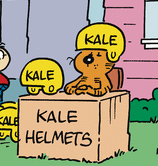|
lotus circle posted:She doesn't hate Brad as an act of rebellion though. She hates him because he kept her sheltered away since she was an infant, and never even told her why. Then she gets taken from that home by her uncles, not even knowing why until later, and gets chased by every man who sees her for one reason or another. There are wanted posters plastered with her face, people who want to maim her or worse. And it's not like she was unwilling to reunite with Brad at first when he found her in the cavern - she just wanted to know why. It never really occurred to me before that you're maybe supposed to assume what you have here, that Brad literally has never told Buddy why going outside might be dangerous for her and the situation with her being the only known living female of the species (at least locally). Since this is only stated by omission I just kind of assumed that Buddy was doing the moody teenager thing which generally makes Brad's actions (at least initially) seem fairly logical. If Brad has actually sheltered Buddy for years without ever once actually spelling out the state of the world that they live in and their place within it then he's way more of a broken person (or intentionally abusive rear end in a top hat but given his history I'll give him the benefit of the doubt) than I thought even at the start of the game.
|
|
|
|

|
| # ? May 2, 2024 22:45 |
|
Agean90 posted:It's not the first time people identify with a pov character even if they're poo poo people, see John Martson. A lot of people find it hard to parse how you can have a sympathetic character - or even just a protagonist in general - who is also a terrible person. Joyful actually deals with that idea very closely, but that's for when we get to it. Mystic Mongol posted:Who cares? Brad's a horrible person who's had a horrible life and now passes that on to others. Saying it was because of Joy or sexual abuse or just being a naturally bad person doesn't change the fact that he's the worst and a mass murderer and ruined everything. One of the main themes of the game is the cycle of abuse. Marty abused Brad and his sister, Brad's perceived failure to protect Lisa leads to him vowing never to be like Marty. So Brad winds up going too far in the other direction and eventually becomes his father in a different way. Again, this comes up in Joyful, how one person's acts can have far-reaching consequences.
|
|
|
|
RabidWeasel posted:It never really occurred to me before that you're maybe supposed to assume what you have here, that Brad literally has never told Buddy why going outside might be dangerous for her and the situation with her being the only known living female of the species (at least locally). Since this is only stated by omission I just kind of assumed that Buddy was doing the moody teenager thing which generally makes Brad's actions (at least initially) seem fairly logical.
|
|
|
|
Yeah, I don't think Brad is supposed to be intentionally abusive, he's just an unwitting victim of the cycle of abuse.
|
|
|
|
Waffleman_ posted:Yeah, I don't think Brad is supposed to be intentionally abusive, he's just an unwitting victim of the cycle of abuse. Its why the whole thing is tragic really. Brad started out in a bad situation, and now lives in a situation where getting any help for it is pretty much impossible. He fell back on what he knew, what he new was poo poo and he had absolutely no way to learn anything new to counter it.
|
|
|
thevoiceofdog posted:It's loving garbage I feel like that's unfair. It's definitely ROMhack-y; The gameplay confuses 'hard' with 'tedious' in a lot of places, and there's dire need of an editor (that preferably speaks English as a first language) but saying it's terrible through and through ignores the quality of the music, art, and set pieces in a lot of places. For example the martial arts tournament I'd honestly say matches up with some of LISA's highlights. I don't expect it to be made way better even if there is a final release, but I think it's definitely worth seeing in the form of an LP or stream or whatever. Waffleman_ posted:Yeah, I don't think Brad is supposed to be intentionally abusive, he's just an unwitting victim of the cycle of abuse. From his point of view, why WOULD he tell Buddy about the state of the world? What good would it do to tell his 12 year old (or whatever) daughter that society had collapsed for reasons nobody understood, the human race was doomed, and almost everyone out there would be out to kill/maim/rape her? It doesn't make it the right or wrong thing to have not told her. It's just worth remembering it's not completely illogical. Cuntellectual fucked around with this message at 11:10 on Jan 26, 2017 |
|
|
|
|
You know, all this talk about differing personal interpretations of Brad and his actions reminds me of Spec Ops: The Line. There's a lot more going on in that one that just an examination of the character's actions, it gets pretty heavy, especially for an ostensibly AAA title, but there's definitely a lot of subjectivity in how a player will feel about the main character's actions. And thinking about it, while Spec Ops: The Line deliberately borrows from Heart of Darkness, I think Lisa becomes a sort of inadvertent reversal, in that rather than becoming like that which he was seeking, Brad instead found that he had already become that which he had been running from (i.e., his abusive father, or the memory thereof, to be precise). I guess a more apt comparison for Lisa is Falling Down, another really good work where a lot of people completely misunderstand the main character and consider him far more heroic than he actually was.
|
|
|
|
EclecticTastes posted:You know, all this talk about differing personal interpretations of Brad and his actions reminds me of Spec Ops: The Line. There's a lot more going on in that one that just an examination of the character's actions, it gets pretty heavy, especially for an ostensibly AAA title, but there's definitely a lot of subjectivity in how a player will feel about the main character's actions. And thinking about it, while Spec Ops: The Line deliberately borrows from Heart of Darkness, I think Lisa becomes a sort of inadvertent reversal, in that rather than becoming like that which he was seeking, Brad instead found that he had already become that which he had been running from (i.e., his abusive father, or the memory thereof, to be precise). I guess a more apt comparison for Lisa is Falling Down, another really good work where a lot of people completely misunderstand the main character and consider him far more heroic than he actually was. Having just re-watched Falling Down just a couple weeks ago, I totally agree. There's a lot of movies, shows, and books where a lot of people lose the difference between sympathetic hero and identifying protagonist. We have to identify with all protagonists by the nature of how narratives work. We're stuck with them, like them or not. But we don't have to (not should we in some cases) sympathize with the protagonist. There's a lot of writers that do this deliberately to challenge the reader/audience. The aim isn't usually to make the reader think, "Yeah. Evil is good. I guess I'm an rear end in a top hat now." Instead, the aim is usually to make a comment on the veracity of good in contrast to this protagonist that we are stuck loathing for so long. Other characters' virtues are rewarded, and that seems all the more poignant in contrast to this rear end in a top hat we're stuck following around. Think of Jesse Pinkman (good guy, secondary to the protagonist) and Walter White (rear end in a top hat protagonist). Cordelia and King Lear. Bunk and Jimmy McNulty. Rando and Brad are good examples of this too.
|
|
|
|
Railing Kill posted:Having just re-watched Falling Down just a couple weeks ago, I totally agree. There's a lot of movies, shows, and books where a lot of people lose the difference between sympathetic hero and identifying protagonist. We have to identify with all protagonists by the nature of how narratives work. We're stuck with them, like them or not. But we don't have to (not should we in some cases) sympathize with the protagonist. There's a lot of writers that do this deliberately to challenge the reader/audience. The aim isn't usually to make the reader think, "Yeah. Evil is good. I guess I'm an rear end in a top hat now." Instead, the aim is usually to make a comment on the veracity of good in contrast to this protagonist that we are stuck loathing for so long. Other characters' virtues are rewarded, and that seems all the more poignant in contrast to this rear end in a top hat we're stuck following around. Think of Jesse Pinkman (good guy, secondary to the protagonist) and Walter White (rear end in a top hat protagonist). Cordelia and King Lear. Bunk and Jimmy McNulty. Rando and Brad are good examples of this too. What I think gets a lot of viewers of Falling Down is that, like Lisa, you're mostly seeing things through the viewpoint of the main character, and it's not until a critical moment near the end that it's plainly laid out that the main character created most of his problems himself, and you realize that even before he was pushed over the edge, he wasn't a very good person. The final exchange between Brad and Lisa could have just been ripped straight from the movie. "I'm the bad guy?" "Yeah." "How did that happen?" I think a lot of people end up missing that sort of mental off-ramp that's supposed to turn you from "yes, he's a monster, but only because society pushed him TOO FAR, MAN!" and into "oh, he was always a monster, he just needed a reason to let loose". Another comparison is the ending of Nabokov's Lolita, where it turns out Humbert Humbert was totally full of poo poo, and was actually a horrible creep the whole time. I mean, not surprising from a modern perspective, but you get the idea.
|
|
|
|
Railing Kill posted:Having just re-watched Falling Down just a couple weeks ago, I totally agree. There's a lot of movies, shows, and books where a lot of people lose the difference between sympathetic hero and identifying protagonist. We have to identify with all protagonists by the nature of how narratives work. We're stuck with them, like them or not. But we don't have to (not should we in some cases) sympathize with the protagonist. There's a lot of writers that do this deliberately to challenge the reader/audience. The aim isn't usually to make the reader think, "Yeah. Evil is good. I guess I'm an rear end in a top hat now." Instead, the aim is usually to make a comment on the veracity of good in contrast to this protagonist that we are stuck loathing for so long. Other characters' virtues are rewarded, and that seems all the more poignant in contrast to this rear end in a top hat we're stuck following around. Think of Jesse Pinkman (good guy, secondary to the protagonist) and Walter White (rear end in a top hat protagonist). Cordelia and King Lear. Bunk and Jimmy McNulty. Rando and Brad are good examples of this too. McNulty's a complicated one, I think. I mean, they're all complicated, but, barring the fifth season, McNulty's trying. He's bad at it, and some seasons he's worse, but he knows he hurts people and sometimes he even manages to stop. The fourth season has him pretty much offscreen since his life's getting in order. He's more like Don Draper, where the protagonist isn't good, but that just emphasizes the primary struggle in his arc is man versus self.
|
|
|
|
EclecticTastes posted:What I think gets a lot of viewers of Falling Down is that, like Lisa, you're mostly seeing things through the viewpoint of the main character, and it's not until a critical moment near the end that it's plainly laid out that the main character created most of his problems himself, and you realize that even before he was pushed over the edge, he wasn't a very good person. The final exchange between Brad and Lisa could have just been ripped straight from the movie. This analysis reminds me of a post-Romantic view of Paradise Lost. The romantics... romanticized Lucifer, some of them going as far as to say we should sympathize with him and he was pushed into it by God and logic and etc, etc. While this is fine in a more deliberate retelling of that story, like the graphic novel Lucifer (where Lucifer is explicitly sympathetic and not evil), it's considered a pretty goofy take on Paradise Lost these days. Now, scholars mostly agree that Lucifer's fall is meant by Milton to trick you into sympathizing with him, only to get to the end and see what a monster he is... and always was. Milton was subversive in a lot of ways, he was also deeply devout and would never have deliberately made the Morning Star sympathetic. That, I think, was wishful thinking on the part of the Romantics. But what I'm saying is, that same "ah ha" moment you're supposed to get at the end of Falling Down happens in Paradise Lost. You're supposed to get all fired up at the beginning and sympathize with his rebellion, have that revelation at the end (no pun intended), and then look back on your literal sympathy for the devil and feel like a flawed, human dickhead. I don't know if Brad is quite the same, but maybe. We can pretty easily see how this can happen: we can get tricked into sympathizing with at least his cause, if not his methods, and then the game emotionally manipulates us into feeling like assholes for having collaborated with all of his murderous shenanigans. He also never really changes, so he is like Falling Down's protagonist in that way: he didn't fall; he was always fallen. I'll stop being an English professor now.
|
|
|
|
Railing Kill posted:Having just re-watched Falling Down just a couple weeks ago, I totally agree. There's a lot of movies, shows, and books where a lot of people lose the difference between sympathetic hero and identifying protagonist. We have to identify with all protagonists by the nature of how narratives work. We're stuck with them, like them or not. But we don't have to (not should we in some cases) sympathize with the protagonist. There's a lot of writers that do this deliberately to challenge the reader/audience. The aim isn't usually to make the reader think, "Yeah. Evil is good. I guess I'm an rear end in a top hat now." Instead, the aim is usually to make a comment on the veracity of good in contrast to this protagonist that we are stuck loathing for so long. Other characters' virtues are rewarded, and that seems all the more poignant in contrast to this rear end in a top hat we're stuck following around. Think of Jesse Pinkman (good guy, secondary to the protagonist) and Walter White (rear end in a top hat protagonist). Cordelia and King Lear. Bunk and Jimmy McNulty. Rando and Brad are good examples of this too. The only thing I've seen pull it off is an episode of Paranoia Agent, where the main character is a cop robbing people to pay off a debt and it's made pretty clear that he's a terrible person. Largely because he's never made to look cool or competent at all, and is mainly just shown to be an overweight creep robbing old ladies to pay off a debt that was his own fault to begin with, even as the show repeatedly cuts away to the kind of glamourized he-man narrative in a manga he reads that he'd like to believe he's living out. Also because it's sort of an anthology show to a degree, you only need to spend one episode in his head so they don't have to deal with the kind of familiarity breeding forgiveness that longer narratives suffer from.
|
|
|
|
The Vosgian Beast posted:The only thing I've seen pull it off is an episode of Paranoia Agent, where the main character is a cop robbing people to pay off a debt and it's made pretty clear that he's a terrible person. Largely because he's never made to look cool or competent at all, and is mainly just shown to be an overweight creep robbing old ladies to pay off a debt that was his own fault to begin with, even as the show repeatedly cuts away to the kind of glamourized he-man narrative in a manga he reads that he'd like to believe he's living out. Also because it's sort of an anthology show to a degree, you only need to spend one episode in his head so they don't have to deal with the kind of familiarity breeding forgiveness that longer narratives suffer from. You forgot the bit where the guy also had a hidden camera in his daughter's bedroom and would watch her undress. It definitely played on the cognitive dissonance between the life he led and the life he tried to fool himself he led, but the audience was at no point intended to sympathize with him or his actions. A better example from Paranoia Agent would be Tsukiko, who the show fools us all into thinking is just an innocent victim of circumstance, but it turns out (tagging because Paranoia Agent is good and you should watch it right now, it's not even that long) not only did she actually make everything up as people suspected, her denial of personal responsibility is what created Li'l Slugger in the first place, culminating in a city-destroying psychic phenomenon that was only stopped when she finally owned up to her failings. An anime that really plays around the sort of Paradise Lost story structure is Death Note. Sure, the main character's got a massive god complex and the power to kill anyone he wants, but he's only killing bad people. And then a federal agent. And then that agent's bereaved girlfriend. And there's a point, and it may vary from person to person, where the viewer notices they're rooting for this guy to kill people whose only crime is trying to stop a mass-murdering psychopath. And then there's the lovely anime fans who act like he was some sort of martyr who totally should have been allowed to keeping killing people at his increasingly erratic whims.
|
|
|
|
EclecticTastes posted:I think a lot of people end up missing that sort of mental off-ramp that's supposed to turn you from "yes, he's a monster, but only because society pushed him TOO FAR, MAN!" and into "oh, he was always a monster, he just needed a reason to let loose". Another comparison is the ending of Nabokov's Lolita, where it turns out Humbert Humbert was totally full of poo poo, and was actually a horrible creep the whole time. I mean, not surprising from a modern perspective, but you get the idea. Lolita's a good one, since it takes a lot of people until their second read to notice the finer details, like when they went to the beach and had a wonderful day eating ice cream and it only took her an hour to cry herself to sleep that night, but tomorrow will be a nice day, maybe they should go to the mountains. Humbert's such a charismatic figure and his words so self-serving, some come away from it thinking his only failings came at the end, rather than, say, everything he did the whole way through. EclecticTastes posted:An anime that really plays around the sort of Paradise Lost story structure is Death Note. Sure, the main character's got a massive god complex and the power to kill anyone he wants, but he's only killing bad people. And then a federal agent. And then that agent's bereaved girlfriend. And there's a point, and it may vary from person to person, where the viewer notices they're rooting for this guy to kill people whose only crime is trying to stop a mass-murdering psychopath. And then there's the lovely anime fans who act like he was some sort of martyr who totally should have been allowed to keeping killing people at his increasingly erratic whims. And then they point to the fact that later on in the series, they explicitly state how crime is at an all-time low, which, by anyone's metric, is a good thing, right? People are safe, the streets have never been more secure, sure, people are afraid to commit even the slightest transgression in case their hearts explode out of the blue, but if the ever-present threat of swift and decisive death for seemingly no reason is what it takes to keep people in line, so be it. Light Was Right. The fact his utopia will inevitably come crashing down after the end of the tale only further enforces that view, right?
|
|
|
|
Kaboom Dragoon posted:people are afraid to commit even the slightest transgression in case their hearts explode out of the blue, but if the ever-present threat of swift and decisive death for seemingly no reason is what it takes to keep people in line, so be it lmfao, this is literally Kant. Is Death Note an anime version of The Leviathan?
|
|
|
|
I'm willing to bet there's a not-insignificant overlap between people who unironically think Light Yagami did nothing wrong and Trump supporters Make Japan Safe Again
|
|
|
|
Kaboom Dragoon posted:And then they point to the fact that later on in the series, they explicitly state how crime is at an all-time low, which, by anyone's metric, is a good thing, right? People are safe, the streets have never been more secure, sure, people are afraid to commit even the slightest transgression in case their hearts explode out of the blue, but if the ever-present threat of swift and decisive death for seemingly no reason is what it takes to keep people in line, so be it. Light Was Right. The fact his utopia will inevitably come crashing down after the end of the tale only further enforces that view, right? Light was a chump, all that time worried about stopping average normal crime that just went underprosecuted, instead of looking at larger systemic things like wealth inequality that could never easily change without his kind of supernatural power. Just imagine what he could have done targeting (and briefly controlling) the top one percent of the top one percent.
|
|
|
|
LeftistMuslimObama posted:lmfao, this is literally Kant. Is Death Note an anime version of The Leviathan? Bits and pieces, but it's more concerned with the idea of whether it's right to enforce an absolute law in the name of keeping people safe, and what would happen if anyone other than an absolute paragon of human virtue got hold of such a power. They spell it out clearly that any 'good' person would've tried it once or twice out of curiosity, seen that it got people killed and vowed never to use it again. Instead, Light goes 'holy poo poo, this is loving awesome!' declares himself God of the new world and starts delivering justice to anyone who even slightly inconveniences his plan.
|
|
|
Kaboom Dragoon posted:And then they point to the fact that later on in the series, they explicitly state how crime is at an all-time low, which, by anyone's metric, is a good thing, right? Crime wasn't at an all time low, some crazed sociopath was murdering thousands of people every month. Plus you get some glimpses of organized crime later in Death Note, which is ticking along just fine, kidnapping, holding hostages, selling drugs and guns, and generally being awful. Kira's too busy killing daytime television hosts who aren't showing enough affection for the world's new god to actually investigate criminals. The only crime he stopped were crooks who had already been identified by the police. Or, near the end, who were accused of being criminals on a talk show. Which is like trials, I guess.
|
|
|
|
|
LeftistMuslimObama posted:lmfao, this is literally Kant. Is Death Note an anime version of The Leviathan? I'm not sure you're thinking of Kant.
|
|
|
|
On a lighter note, this brought a tear to my eye https://www.youtube.com/watch?v=Js35aRJdw30
|
|
|
|
Kaboom Dragoon posted:On a lighter note, this brought a tear to my eye Now we just need an ending where Brad and the other joy mutants turn into tang.
|
|
|
|
Sinner Sandwich posted:I'm not sure you're thinking of Kant. You're right I'm thinking of Hobbes. It's been ages since that pointless philosophy degree 
|
|
|
|
Bifauxnen posted:Light was a chump, all that time worried about stopping average normal crime that just went underprosecuted, instead of looking at larger systemic things like wealth inequality that could never easily change without his kind of supernatural power. Just imagine what he could have done targeting (and briefly controlling) the top one percent of the top one percent. God, the same thought has been on my mind for months.
|
|
|
|
Can someone refresh my memory: How was the protagonist in Falling Down always fallen? I remember his wife got a restraining order against him and he was living with his mother before the story began, but I remember the face of the cop talking to his wife being a puzzled one, while the wife admitted that he'd never hurt anyone or even acted aggressively towards her or their daughter. It did come across to me as a man robbed of every reason to remain civilized beyond his own empathy, and he even tried to hold onto the shreds of that until the end where he tricked the old detective into shooting him. I must have missed something.
|
|
|
|
Man, I should get around to reading the latter half of Death Note. The climax at the end of the first half just sort of took all of the wind out of the series. e: yeah, I was a manga reader and man did it just sort of wither and die. ManlyGrunting fucked around with this message at 22:55 on Feb 5, 2017 |
|
|
|
ManlyGrunting posted:Man, I should get around to reading the latter half of Death Note. The climax at the end of the first half just sort of took all of the wind out of the series. It's good. A lot of people seem to like it less but I think it's just as good. People just get too attached to L as the hero. e: From what I understand the manga is actually a lot shittier than the anime, though. Something about the author artificially stretching the length to end it on chapter 108 or something.
|
|
|
|
ArgumentatumE.C.T. posted:Can someone refresh my memory: How was the protagonist in Falling Down always fallen? I remember his wife got a restraining order against him and he was living with his mother before the story began, but I remember the face of the cop talking to his wife being a puzzled one, while the wife admitted that he'd never hurt anyone or even acted aggressively towards her or their daughter. It did come across to me as a man robbed of every reason to remain civilized beyond his own empathy, and he even tried to hold onto the shreds of that until the end where he tricked the old detective into shooting him. Rewatch the scene where he finds and watches the home movie.
|
|
|
|
Genocyber posted:It's good. A lot of people seem to like it less but I think it's just as good. People just get too attached to L as the hero.
|
|
|
|
EclecticTastes posted:Rewatch the scene where he finds and watches the home movie. He's anal-retentive and easily frustrated? I guess that did kind of make him an accident looking for a place to happen, but it still feels uncharitable to call him a monster for that.
|
|
|
|
ArgumentatumE.C.T. posted:He's anal-retentive and easily frustrated? I guess that did kind of make him an accident looking for a place to happen, but it still feels uncharitable to call him a monster for that. The context was meant to indicate that it wasn't a one-time deal. Anyone who goes off like that that easily is more than just an accident waiting to happen. He was a control freak, and one can easily infer that while he might not have physically abused his wife, it's likely he was verbally abusive, and it probably wouldn't have taken too much to escalate that abuse (keep in mind that in 1993, a lot of people didn't consider verbal abuse to be "real" abuse). Much like Brad, he never even realized he was doing it until something shocked him into seeing his actions in a new light. Just because he kept a lid on it doesn't mean the monster wasn't there the whole time, and the only thing keeping him from going over the line (any further, anyway) during his rampage was his own desire to maintain what he saw as the moral high ground. As long as he only went after the "right" people, he wasn't the bad guy, he was a hero for the common man. That's the real reason he was so angry that the neo-nazi tried to claim they were the same, nazis are bad guys and he was absolutely certain he was a good guy. In fact, by playing Lisa in as "good" a fashion as possible (however you want to define that), rather than casting Brad as a more complex, morally ambiguous figure, may actually be putting him in that same position of self-delusion. He's not the bad guy, he's only hurting the people who get in his way when he's trying to find Buddy.
|
|
|
|
It certainly doesn't hurt that for the first third of the game, at least, the majority of enemies you fight either attack you first or state in no uncertain terms what they want to do to Buddy. It's not really until you encounter Rick and Sticky for the first time that you're forced to look at Brad's actions from an outsider's perspective. You know he's not a swell guy before then, but you can easily justify the majority of his actions as him doing what has to to find her. Once he starts with the torture though, that's the first point where many people will start asking themselves who Brad really is underneath it all.
|
|
|
Dog I assume you're not interested in showing off The Pointless? I liked it even with it's flaws but I was holding off on doing a playthrough of it since I don't have a mic to record voice commentary.EclecticTastes posted:The context was meant to indicate that it wasn't a one-time deal. Anyone who goes off like that that easily is more than just an accident waiting to happen. He was a control freak, and one can easily infer that while he might not have physically abused his wife, it's likely he was verbally abusive, and it probably wouldn't have taken too much to escalate that abuse (keep in mind that in 1993, a lot of people didn't consider verbal abuse to be "real" abuse). Much like Brad, he never even realized he was doing it until something shocked him into seeing his actions in a new light. Just because he kept a lid on it doesn't mean the monster wasn't there the whole time, and the only thing keeping him from going over the line (any further, anyway) during his rampage was his own desire to maintain what he saw as the moral high ground. As long as he only went after the "right" people, he wasn't the bad guy, he was a hero for the common man. That's the real reason he was so angry that the neo-nazi tried to claim they were the same, nazis are bad guys and he was absolutely certain he was a good guy. I still find the scene where you're offered three of your gang member's lives over Buddy's well being to be the most fascinating choice in the game. It I'm not arguing Brad ISN'T a bad guy, I just don't think he's a monster. In a figurative sense at least, I think the ending showed pretty plainly he's one in a literal sense.  Kaboom Dragoon posted:On a lighter note, this brought a tear to my eye I was absolutely expecting that to end with a red flash. *ding* Cuntellectual fucked around with this message at 03:42 on Feb 5, 2017 |
|
|
|
|
Is there an ETA of when you're starting Joyful?
|
|
|
|
Nope. When I have time, lots of stuff going on. Hopefully soon. Also is Ledgy still reading the thread? Wanted to ask you something in a PM.
|
|
|
|
EclecticTastes posted:You forgot the bit where the guy also had a hidden camera in his daughter's bedroom and would watch her undress. It definitely played on the cognitive dissonance between the life he led and the life he tried to fool himself he led, but the audience was at no point intended to sympathize with him or his actions. A better example from Paranoia Agent would be Tsukiko, who the show fools us all into thinking is just an innocent victim of circumstance, but it turns out (tagging because Paranoia Agent is good and you should watch it right now, it's not even that long) not only did she actually make everything up as people suspected, her denial of personal responsibility is what created Li'l Slugger in the first place, culminating in a city-destroying psychic phenomenon that was only stopped when she finally owned up to her failings. I mean my point WAS that he was never sympathetic
|
|
|
|
The Vosgian Beast posted:The only thing I've seen pull it off is an episode of Paranoia Agent, where the main character is a cop robbing people to pay off a debt and it's made pretty clear that he's a terrible person. Largely because he's never made to look cool or competent at all, and is mainly just shown to be an overweight creep robbing old ladies to pay off a debt that was his own fault to begin with, even as the show repeatedly cuts away to the kind of glamourized he-man narrative in a manga he reads that he'd like to believe he's living out. Also because it's sort of an anthology show to a degree, you only need to spend one episode in his head so they don't have to deal with the kind of familiarity breeding forgiveness that longer narratives suffer from. I just want to say thanks for making me watch Paranoia Agent because somehow I knew about the "kid with a bat wearing skates" thing and my brain converted that into meaning that it was a generic shonen show. It, uh, is not one of those.
|
|
|
|
I wonder if a better movie metaphor for a flawed protagonist is Bad Lieutenant (the original). You're obviously not meant to sympathize with or understand the character, more just... witness.
|
|
|
|
RabidWeasel posted:I just want to say thanks for making me watch Paranoia Agent because somehow I knew about the "kid with a bat wearing skates" thing and my brain converted that into meaning that it was a generic shonen show. It, uh, is not one of those. It's really good. We lost Satoshi Kon a million years too soon
|
|
|
|

|
| # ? May 2, 2024 22:45 |
|
Today I learned Carp's basic attack costs 5 SP Yeah, I don't know either
|
|
|

































